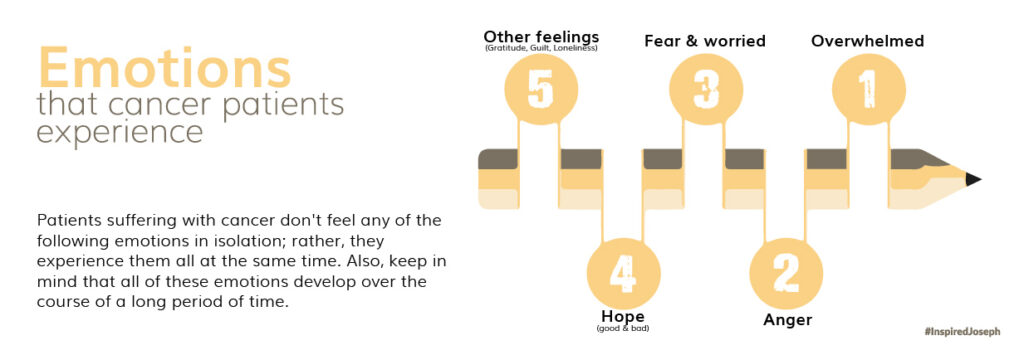Mental Health and Prostate Cancer
Prostate Cancer: What you should know
What Is Prostate Cancer?
When cells in the body start to grow out of control, cancer develops. Cancerous cells can develop from cells in almost any area of the body and then spread to other parts of the body.
When prostate gland cells start to grow out of control, prostate cancer develops. Only males have the prostate gland. It produces some of the fluid that is found in semen.
The prostate is located underneath the bladder (the hollow organ where the urine is stored) and in front of the rectum (the last part of the intestines). Seminal vesicles, a group of glands located just behind the prostate, produce the majority of the fluid needed to generate semen.
The urethra, the tube that transports urine and semen from the body through the penis, passes through the middle of the prostate.
Unfortunately, with men's health, we don't talk about it enough, and prostate cancer gets lost in the conversation.
( Eric McCormack )


Prostate Cancer Different types of prostate cancer
An adenocarcinoma is the most common type of prostate cancer. These tumours arise from gland cells (cells that make the prostate fluid that is added to the semen).
Other cancers that may arise in the prostate include:
- Small cell carcinomas
- Neuroendocrine tumours
- Transitional cell carcinomas
- Sarcomas
These further types of prostate cancer are rare. If you are diagnosed with prostate cancer, it is usually always adenocarcinoma.
Some prostate tumours grow and spread rapidly, but the majority develop slowly. In reality, autopsy examinations reveal that many older men (and even some younger men) who died of other reasons had prostate cancer that did not manifest during their lifetimes. In many instances, neither they nor their physicians were aware that they had it.
Additionally, prostate cancer is classified by its rate of growth. It has two kinds of growth.
- (Fast-growing) aggressive or rapidly expanding
- (Slow-growing) non-aggressive or developing slowly
With prostate cancer that is non-aggressive, the tumour develops slowly. However, with aggressive cancer, the tumour may spread to other regions of the body, such as the bones, and become metastatic.

Prostate Cancer Symtomps
Certain types of prostate cancer are nonaggressive, therefore you may not have any symptoms. However, advanced prostate cancer is often accompanied with symptoms.
If you experience any of the following signs or symptoms, contact your doctor immediately. In addition, other disorders, such as benign prostatic hyperplasia (BPH), may cause some of the symptoms of prostate cancer, so you should see your doctor for a complete diagnosis.
Symptoms of prostate cancer may include urinary and sexual issues, as well as discomfort and numbness.
In its early stages, prostate cancer may not produce any symptoms.
More advanced prostate cancer may produce the following signs and symptoms:
- Difficulty urinating
- Reduced force of the urine stream
- Blood detected in the urine
- Blood inside the sperm
- Bone discomfort/pain
- Weight loss without effort
- Erectile dysfunction

Prostate Cancer Issues with Prostate Cancer
Urinary issues
Because the prostate is situated underneath the bladder and surrounds the urethra, urinary issues are common. Due to its position, a prostate tumour that develops and presses on the bladder or urethra might create complications.
Urinary issues may involve:
- The urge to urinate often
- A slower or weaker-than-normal stream
- Urinary bleeding
A dysfunctional erection may be an indication of prostate cancer. This condition is often known as impotence, making it unable to get and maintain an erection.
Additionally, blood in the sperm after ejaculation might be a sign of prostate cancer.
You may feel numbness or weakness in your legs and feet. If cancer has progressed and is putting pressure on your spinal cord, you risk losing control of your bladder and bowel movements.

Prostate Cancer Causes of prostate cancer and factors that put men at risk
There is no known cause of prostate cancer; however, some risk factors, such as age or a history of the disease in one’s family, may raise one’s probability of having the illness.
Who’s at risk?
Although every man is at risk for developing prostate cancer, there are specific variables that significantly increase that risk. These potential dangers include the following:
- Age — Men under 40 have a low risk of developing prostate cancer, but that risk increases dramatically in their mid 40s. Men over 65 contribute to almost 6 out of every 10 new cases of prostate cancer.
- Family history — Some families seem to have more than one member with prostate cancer. It suggests that there may be a genetic or inherited factor in some cases. Still, most men who get prostate cancer don’t have a history of it in their family. Men are more than twice as likely to get prostate cancer if their father or brother has it. Men are more likely to get the disease if their brother has it than their father. Men with many family members who have had cancer have a much higher risk, especially if their family members were young when the cancer was found.
- Certain ethnicities or races — for instance, African Americans are twice as likely as people with European origins to get prostate cancer or die from it, and the disease is more aggressive when it is discovered. Asian American men, on the other hand, have the lowest rates of getting prostate cancer and dying from it.
- Obesity — Obesity (overweight) does not seem to raise the overall chance of developing prostate cancer. Some studies have shown that obese men have a lower chance of getting a low-grade (slow-growing) form of prostate cancer but a higher chance of getting a more aggressive (fast-growing) form. There is no apparent reason for this. Some studies have also found that obese men may be more likely to have more advanced prostate cancer and die from it, but not all studies have concluded.
- Genetic changes — Several changes (mutations) in genes that are passed down seem to raise the risk of prostate cancer, but they probably only account for a small number of cases overall. For instance:
- Inherited changes in the BRCA1 or BRCA2 genes, linked to a higher risk of breast and ovarian cancer in some families, can also make men more likely to get prostate cancer (especially mutations in BRCA2).
- Men with Lynch syndrome (also known as hereditary non-polyposis colorectal cancer, or HNPCC), a disorder caused by inherited gene alterations, are at a higher risk of developing several cancers, including prostate cancer.
- Other gene changes can also make a man more likely to get prostate cancer.
- Aspects that have less clear effects on the risk of prostate cancer:
- Diet
- Smoking
- Chemical exposures
- Inflammation of the prostate
- Sexually transmitted infections
- Vasectomy
Prostatectomy is one of the most common surgical treatments for prostate cancer.

Prostate Cancer Coping and dealing with your prostate cancer
A cancer diagnosis may radically alter one’s life. Each individual finds a unique method to cope with the mental and physical changes brought on by cancer. However, when you are initially diagnosed with cancer, it may be challenging to know what to do, particularly if you are overwhelmed by various emotions and unknown facts. Here are some coping recommendations to assist you in managing your condition:
1. Get the facts about your cancer diagnosis
Get informed about cancer so you can manage your treatment. Inquire about your cancer, the available treatments, and even a prognosis from your doctor. You may gain more confidence in making treatment choices as you learn more about your cancer. Some suggestions to question:
- What type of cancer do I have?
- Where is cancer located? Has it spread?
- Can my cancer be treated?
- What are my chances to cure?
- What other tests or procedures do I need? Treatment options?
- What to expect during treatment? Side effects?
- What can I do to prevent relapse?
- Is my cancer a genetic issue or inherited?
- What happens if I don’t get treatment?
2. Being truthful and honest to yourself
Communicate openly and honestly with your loved ones, health care professionals, and others. You may feel alone if others attempt to shield you from terrible news by not discussing it. Or, you may feel alone or less supported if you try to appear tough while suppressing your emotions. You may provide mutual support if you and others express their true feelings.
3. Keep your family and friends near.
Maintaining your close relationships will benefit you in coping with cancer. Friends and relatives may give the necessary, appropriate support, such as taking care of your home while in hospital. And they may provide emotional support when you feel overwhelmed by cancer.
4. Find someone to speak with.
Find a great listener who is prepared to listen to you and share your expectations and concerns. It may be a friend or family member. The care and understanding of a counselor, medical social worker, church person, or cancer support group also may be beneficial. Ask your doctor about support groups in your region. Other sources of information include the National Cancer Institute or Cancer Society.
5. Anticipate potential physical adjustments
The ideal time to prepare for physical changes is immediately after a cancer diagnosis and before beginning treatment. Prepare yourself immediately so that you can handle anything in the future.
Ask your healthcare practitioner about any potential changes. Medicines might potentially work and cause hair loss, a weak body, fractured bone, and many more. Expert advice on clothes, cosmetics, wigs, and hairpieces may help you feel more appealing and comfortable. Consider joining a group for cancer patients. Members may share advice that has helped them and others. Consider how treatments will impact your everyday life. Discuss with your provider whether you can maintain your regular schedule. You may need hospitalization or many doctor’s visits. Make accommodations if your treatment will make it difficult for you to carry out your everyday responsibilities.
6. Be vulnerable
Your loved ones can help you do chores, run errands, transport you to appointments, make meals, and assist with home duties. It might provide a chance for your loved ones to support you through a difficult time. Also, encourage your family to accept support when necessary. A diagnosis of cancer impacts the whole family. It also causes stress to those who care about you, particularly. Getting assistance with meals or housework from neighbours or friends might prevent relatives from becoming exhausted.
7. Examine your objectives and priorities
Determine what is essential in your life. Find time for the activities that are most meaningful to you. Examine your schedule and eliminate events that do not align with your objectives.
Try to be honest with your family members. Share your emotions and views with them. Cancer impacts every relationship you have. Cancer may cause worry and panic, but communication can help alleviate these effects.
8. Maintain your current lifestyle.
Maintain your lifestyle, but be adaptable to change. Take each day as it comes. During times of stress, it’s simple to forget to do so. Preparing and planning may feel like a burden when the future is uncertain.
9. Consider the financial impact of your diagnosis.
Plan your funds. Determine who will do everyday home chores. If you have pets, you should find someone to care for them. After a cancer diagnosis, many unforeseen financial problems might arise. Your medical care may need time away from work or home. Consider the cost of medications, medical devices, travel to the hospital for treatment, and parking fees. Numerous clinics and hospitals provide lists of financial assistance options during and after cancer treatment. Consult your healthcare team on your alternatives.
- Consider these questions:
- Will I be required to take time away from work? What would my benefits be like if I did?
- Will my friends and relatives need to skip work to spend time with me?
- Will my insurance cover these services?
- Will my insurance pay the price of prescription drugs?
- How much will I be charged?
- Are there any organizations that can assist me if my insurance won’t cover my treatment?
- Am I eligible to get disability benefits?
- What impact will my diagnosis have on my life insurance?
- Who do I contact to discuss what my insurance covers?
10. Talk with other cancer patients.
People who have never experienced cancer may have difficulty understanding how you feel. Talking to individuals who have been in your position may be beneficial. Other cancer survivors can learn from your experiences. They can describe what you may anticipate throughout treatments. Communicate with a friend or relative who has experienced cancer. Or connect with other survivors of cancer via support groups. Ask your healthcare practitioner about local support groups. You may contact your local cancer society organization. Reach out to friends and neighbors who have suffered through a severe illness. Ask them how they handled these intricate difficulties.
11. Eliminate stigmas
Some mythological stigmas around cancer remain. Your friends may question whether or not your cancer is infectious. Coworkers may ask about your fitness to do your duties. Some may avoid you out of fear of saying the wrong thing. Numerous individuals will have questions and concerns. Consider how you will interact with people. In general, people will follow your actions. Remind your friends that your illness should not cause them to avoid you.
12. Create your strategies to overcome cancer.
As each individual’s cancer treatment is unique, so are the approaches to cancer. Some Ideas to consider:
- Practice 4-7-8 breathing relaxation techniques.
- Share your emotions with family, friends, a spiritual guide, or a therapist.
- Keep a journal to help with mental organization.
- When confronted with a difficult decision, list the advantages and disadvantages of each option.
- Find a spiritual support system.
- Set aside time for solitude.
- Remain as engaged as possible in work and leisure activities.
- Be ready to say no. Now is the moment to prioritize yourself.
What helped you through difficult moments before your cancer diagnosis will benefit you now. It might be a personal friend, a religious leader, or a beloved hobby. Turn to these comforts immediately. Additionally, be willing to explore new treatments for your cancer.

Scanxiety – Phases, Symptoms, and Coping with it

Reaching new levels of relaxation using guided imagery – for stress and anxiety

The Emotion Wheel: Everything to know

Coping with lung cancer

Deeper insight into what cancer patients feel
